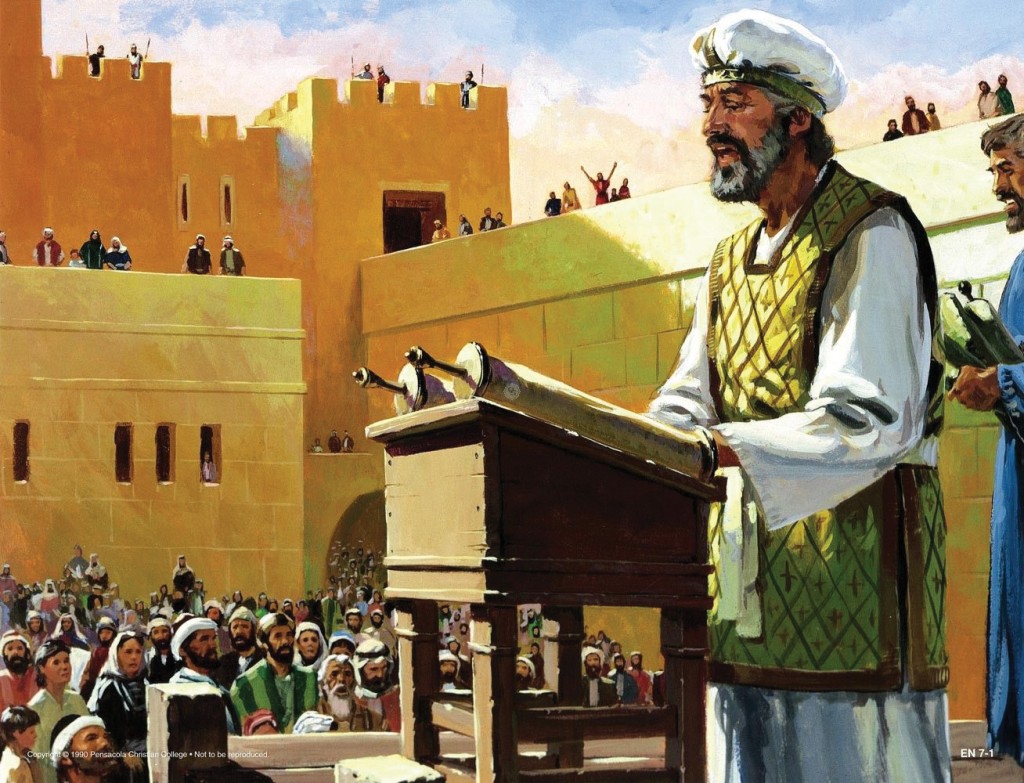You have free articles remaining this month.
Subscribe to the RP Witness for full access to new articles and the complete archives.
The crux of our weekly experience of corporate worship is undoubtedly the sermon. The Word of God, and especially the preaching of it, is the powerful means by which faith is given and strengthened by our Lord (Rom. 10:14–17).
With this emphasis made so explicit in the New Testament, we may be tempted to think of it as a contrast to the Old Testament. After all, much of the Old Testament is consumed with rituals and institutions that have been fulfilled in Christ and are not part of our experience, such as the sacrifices, the temple, and the priesthood.
Since the advent of our Savior, the worship of God has moved from the realm of types and shadows into spiritual clarity and simplicity. But not everything has changed. The treasure of God’s Word, and the blessing of hearing it preached, are things that unite the worship of the church in all ages and make the experience of faith between the two Testaments more alike than different.
1. Consider how the Word of God was central to the life of faith in the Old Testament. The credal statement of faith in Deuteronomy 6:4–9, known as the Shema, envisions the love of God being expressed in a life that revolves around His Word, which is to be in our hearts, taught to our children, and the topic of our conversation day and night.
No passing ritual is mentioned in this compendium of true faith, but only the Word of God that abides forever. Consider also that giant of the Psalms, Psalm 119, which by its sheer size brings an unmistakable emphasis to the Psalms and to the Old Testament itself.
When the inspired writer thought to highlight the one means of grace, which above all others built and blessed his faith and afforded him the sweetest communion with God, he did not write 176 verses about the sacrificial system. The Word of God has always been central to the life of faith.
2. Consider how the preaching of the Word was a vital and consistent element of Old Testament worship. By apostolic times, James could say that the Scriptures had been preached “throughout many generations” and “in every city” during the weekly services of the synagogues (Acts 15:21). These local, weekly gatherings to hear the Word preached likely went back to very ancient times—at least as far back as Psalm 74:8 takes us, which mentions the “meeting places” (or “synagogues” in KJV) throughout the land.
One of the main functions of the priesthood was to teach the people (Lev. 10:11; Mal. 2:7). The Levites, too, were called to preach and teach (Deut. 33:10; Neh. 8:7–9) and were likely dispersed throughout the land of Israel for this very purpose (Num. 35:1–8).
When did the people hear them preach? We get a hint from Leviticus 23:3, which calls the Sabbath a “holy convocation,” or a day to gather together. Putting all these pieces in place, we can conclude that the rhythm of a life of faith in the Old Testament was set to the weekly proclamation of the Word, not just the annual festivals and their sacrifices.
3. Consider how some of the greatest figures of the Old Testament are primarily known for their faithful proclamation of the Word. Moses and Ezra, the two pillars that stand at the beginning and end of the Old Testament, exemplify Spirit-filled preaching and how the Lord uses it in the lives of His people. Deuteronomy is essentially a sermon series that has lost none of its power to convict and comfort. Ezra’s proclamation of the Word in Nehemiah 8 is a particularly amazing scene.
The exiles who returned had already rebuilt and dedicated the temple, but instead of gathering at the place of sacrifice, the people built an elevated pulpit in an open square and called upon Ezra to preach. The people listened from the light of morning until noon, wept and rejoiced, and gathered again the next day to hear more. Nehemiah 8 leaves little doubt about the centrality of the Word, and especially the preaching of the Word, in the life and worship of the ancient church.
The experience of God’s people in the Old Testament may seem foreign to us in some respects, but what lies underneath the differences is a foundation of continuity. The faithful preaching and hearing of the Word of God is an abiding mark of the true Church, in the days of Moses as much as today.
God’s Word remains our constant treasure, and hearing its faithful proclamation remains our constant need. When your preacher begins his sermon this Lord’s Day, give thanks for this blessing that you share with God’s people throughout the history of the covenant of grace. We are never so unified as the body of Christ, throughout the world and throughout the ages, as when we hear the words of life with faith.
